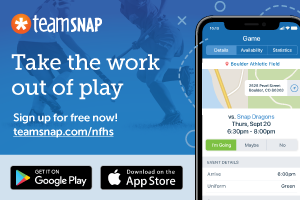Arizona’s Pre-Contest Medical Preparedness Card Helps Save Lives
By John Gillis on December 19, 2017 hst PrintThe Arizona Interscholastic Association (AIA) has created a “Pre-Contest Medical Preparedness Card” that realizes numerous tangible benefits, including helping save lives.
The front side of the card features the AIA’s name, logo and slogan, followed by the words “Respect the Game.” On the backside are the following four questions:
- Is there a Qualified Medical Practitioner (QMP) on site? (MD/DO/NP/PA/AT)
- Is there an Emergency Action Plan (EAP) in place?
- Is there an Automated External Defibrillator (AED) available and accessible?
- Where is the Emergency Entrance for this facility?
According to David Hines, AIA executive director, those four questions are intended to be directed to the contest officials and the coaches.
“We issue these cards to every official statewide and a copy of the card to every coach at the preseason coaches meeting so they are aware that it’s coming,” Hines said. “Then, we go to the officials, so they have the card for their coaches meeting prior to every contest.”
The idea for this card came from the AIA’s Sports Medicine Advisory Committee and Chairperson Dr. Javier Cardenas, who is also on the NFHS Sports Medicine Advisory Committee and the National Football League’s Concussion Committee.
“Dr. Cardenas is a former wrestler at Phoenix (Arizona) Chandler High School who taught at the elementary school level following college,” Hines said. “He then went back to medical school and now is a neurologist at Barrows Hospital in Phoenix. After our committee devised the card, the NFL determined that it would also use it in its games.”
The card is used for all team sports within the AIA at all levels – freshman, junior varsity and varsity. Hines noted that it started as an educational effort and its intent is not to delay a contest, but rather to ensure that the proper precautions are taken to prevent any unfortunate incidents.
“We’re not going to hold up the game and we’re not going to cancel the game,” Hines explained. “So, if we do have an incident – if someone goes down – you have a medical person there. If not, someone should be calling 911 and administering medical care.
“We discussed it last year as we wanted to give people a heads-up, and we started it this fall. Among our positive feedback is when we’ve had an incident, someone is there RIGHT NOW. The time to respond is critical in incidents such as this, so we’ve got to respond quickly. In other cases, kids have responded quickly.”
Hines also presented information regarding the card at the NFHS Sections 7 and 8 meeting held September 17-19 in Gleneden Beach, Oregon.
“The response to my report at the Sections 7 and 8 meeting was very positive,” Hines said. “A couple [state association executive] directors at the meeting said, ‘This is really good – we’ve been talking about this and we can steal your idea and use it in our state.’”
With a solid program already in place, Hines notes that there are always opportunities to further improve upon it.
“We feel really good about the card,” Hines began. “However, we’re going to wait until the end of the year to evaluate it, at which time we might modify some of the questions.
“We might also go to someone other than the head coach – perhaps the trainer. What happens if the head coach has a heart attack? We want the kids trained – one kid calls 911, another one makes sure the ambulance is called and on its way, and someone else can get the AED. Ideally, we’d like to have the plans in place.”
John Gillis
John Gillis is associate director of video services of the National Federation of State High School Associations.
Most Recent Articles
- nfhs news NFHS Learning Center Unveils School Honor Roll Program
- NFHS Network Contact Information
- nfhs news Shout-out to Health-Care Workers and State High School Associations
- state news Stadiums Across Colorado Light Up to Show Support for Students
- gymnastics-girls article ‘They became a family’: How New Castle gymnastics qualified for state for first time since 2002



